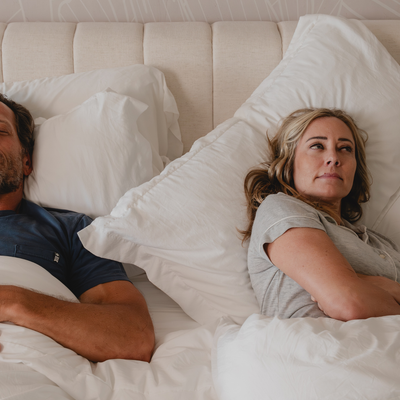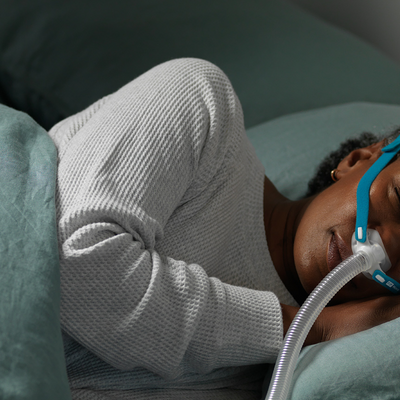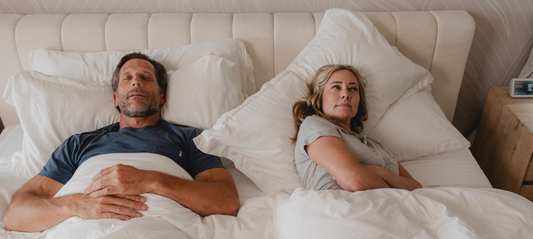Writen by Nancy Kirk
June 11, 2024
Is your father struggling with sleep? Or maybe it’s you. If you’re feeling fatigued, unfocused, and unrested, it could be more than just the busy lifestyle of parenting. There’s a chance sleep apnea could be the culprit. Sleep apnea is more prevalent in men, with studies showing that they are two to three times more likely to develop the condition than women. The risk of sleep apnea increases with age, particularly after age 40, due to factors like weight gain and changes in your respiratory system. Plus, up to 90% of people with this condition don’t realize they have it. (1) This Father’s Day, we’re exploring the warning signs of sleep apnea that may get ignored.
Key Takeaways
- Men are two to three times more likely to develop sleep apnea than women, especially after age 40, due to factors like weight gain and changes in the respiratory system.(2)
-
There are overlapping symptoms of sleep apnea and the effects of parenting, such as daytime sleepiness, lack of focus, and headaches.
-
Studies show fathers typically gain around 4 pounds after their first child. Excess weight increases the risk of sleep apnea.
-
Not all snorers have sleep apnea, but loud snoring warrants an evaluation to prevent long-term health issues, especially when it’s accompanied by gasping or choking sounds.
- A family history of sleep apnea increases your risk due to inherited physical traits and genetic predispositions and can also affect your child’s risk of eventually developing the condition.
The Pains of Parenting (Fatigue, Brain Fog, and Beyond)
The side effects of parenting are similar to sleep apnea symptoms: Sleepless nights, daytime sleepiness, lack of focus, headaches, and even stress. This is one of the main reasons this widespread condition often goes overlooked. It’s estimated that 90% of people with sleep apnea don’t even know they have it.
It’s easy to blame your fatigue and scattered brain on the challenges faced by raising a child, but there may be more to it than that. As a parent, it’s crucial to prioritize your health so you can be the best parent you can be. Be aware of the signs of sleep apnea, and make sure you don’t automatically attribute them to the stresses of parenting. Proper diagnosis and treatment can significantly improve your quality of life, allowing you to be more present and energetic for your children. Don’t let sleep apnea go unnoticed – your health and your family’s well-being depend on it.
Symptoms of Sleep Apnea
- Loud snoring
- Episodes of stopped breathing during sleep
- Gasping for air during sleep
- Morning headaches
- Excessive daytime sleepiness
- Difficulty concentrating
- Irritability
- Dry mouth or sore throat upon waking
- Excess weight
The “Dad Bod:” Exploring OSA, Parenthood, & Weight Gain
Yes, “dad bods” are really a thing, according to science! The term “dad bod” to describe a common man’s body type, which is slightly overweight without a ton of muscle. A recent study published in The Washington Post examined 10,000 men for 20 years and revealed that first-time dads saw an average BMI increase of 2.6% during the study. This accounted for an average weight gain of around 4 pounds.1
While there’s nothing wrong with having a “dad bod,” it’s important to know that excess weight does influence your risk of sleep apnea. Weight gain is common as you age, especially if you’re a new parent adapting to a new lifestyle with less free time. Excess fat can increase pressure on the airway, making it more likely to develop sleep apnea.
Conversely, sleep apnea itself can also contribute to weight gain. Poor sleep affects your ability to regulate hunger hormones, increasing appetite and cravings for high-calorie foods. Additionally, fatigue from disrupted sleep can reduce your motivation to exercise. This creates a vicious cycle where weight gain worsens sleep apnea symptoms, and sleep apnea symptoms make it harder to lose weight. When you top that all off with parenting, avoiding weight gain may be impossible. However, proper sleep apnea treatment can make maintaining a healthy weight and lifestyle easier.
Is it Snoring… or Is it Sleep Apnea?
Is snoring bad? Not necessarily. Snoring is a common condition that is usually harmless and can affect anyone, although it occurs most frequently in overweight men. However, it’s often a telltale sign of sleep apnea. Unlike simple snoring, which is usually harmless, sleep apnea often results in fragmented sleep and lower oxygen levels in the blood, which can contribute to daytime fatigue, cardiovascular issues, and other health concerns.
If you snore loudly and frequently, especially if it is accompanied by gasping or choking sounds, we strongly recommend getting tested for sleep apnea. Remember, addressing your sleep apnea can significantly improve your and your family’s life!
Why Men Are More Prone to Sleep Apnea
Men are statistically more likely to develop sleep apnea than women, and several factors contribute to this increased risk. Here are a few reasons men are more prone to sleep apnea:
-
Anatomical differences: Men typically have larger necks and more fat deposits around their upper airways, which can contribute to the airway collapsing more easily during sleep. This structural difference makes it more likely for men to experience the airway blockages characteristic of sleep apnea.
-
Hormonal factors: Testosterone, a hormone more prevalent in men, has been found to influence the muscles around the airway. It can lead to a decrease in muscle tone during sleep, increasing the risk of airway obstruction. In contrast, premenopausal women have higher levels of progesterone, a hormone that has a protective effect of helping to keep the airways open.
- Lifestyle choices: Certain habits are more commonly associated with men, such as higher rates of smoking and alcohol consumption. These can exacerbate sleep apnea. Smoking can lead to inflammation and fluid retention in the upper airway, while alcohol relaxes the muscles of the throat, both increasing the likelihood of airway obstruction during sleep.
Is Sleep Apnea Genetic?
Sleep apnea can indeed have a genetic component. Research has shown that if you have a family history of sleep apnea, you are at a higher risk of developing the condition yourself. This increased risk can be attributed to inherited physical traits. For instance, traits like a recessed chin, a large neck circumference, or enlarged tonsils can be passed down from one generation to the next, all of which can contribute to the development of sleep apnea.
Other factors, such as obesity, can run in families and affect your risk of sleep apnea. Metabolic and hormonal factors influenced by genetics can affect weight and fat distribution, further linking genetics to sleep apnea risk. If sleep apnea is prevalent in your family, you and your children are at higher risk.
5 Tips for Parenting with Sleep Apnea
Parenting alone can lead to a lack of sleep, so when you combine that with sleep apnea episodes, getting the restorative rest you need can be challenging. This combination can leave you feeling exhausted and overwhelmed. This is why getting proper sleep apnea treatment is crucial to maintaining your health, energy, and ability to be present and engaged with your children.
- Prioritize CPAP treatment: Follow your sleep apnea treatment plan diligently, and stay dedicated as you adjust. Effective treatment will improve your sleep quality and energy levels, making it easier to be an engaged parent.
- Establish a routine: Set consistent sleep and wake times to regulate your body’s internal clock. A stable routine helps you and your child get the most restorative sleep possible.
- Ask for help: If possible, ask for help from a partner, family member, or friend if you’re feeling excessively tired so you can get some much-needed uninterrupted rest.
- Create a calming environment: Before sleeping, create a comfortable, cool, and quiet environment. Limit screen time before bed and practice relaxation techniques to fall asleep more easily.
- Develop a healthy lifestyle: Take care of yourself with regular exercise, a healthy diet, and stress-reducing activities like stretching. A healthier you means being more present and energetic for your children.
How CPAP Treatment Can Make You a Better Parent
Living with undiagnosed sleep apnea can significantly impact your ability to parent effectively. The constant fatigue and cognitive impairment that come with untreated sleep apnea can leave you feeling drained, irritable, and less capable of managing the daily demands of parenting. However, CPAP treatment can be a complete game-changer, helping you become a more energetic and attentive parent!
CPAP treatment works by keeping your airway open during sleep, preventing the interruptions in breathing that characterize sleep apnea. This results in more restful and uninterrupted sleep, so you can wake up refreshed and ready to tackle the day. You'll likely also experience improved mood, increased patience, and enhanced focus with better sleep. You'll have more energy to engage in activities with your children, be more present, and handle parenting challenges more easily.
Parenting Benefits of CPAP Treatment
- Enhanced mood: Better sleep leads to a more stable and positive mood, making you more patient and less irritable. Laugh more with your kids!
- Increased focus: CPAP therapy improves concentration and decision-making, helping you manage parenting responsibilities more effectively.
- Longer-lasting energy: Less fatigue means more stamina to play, help with homework, and participate in family activities.
- Improved emotional connection: Being well-rested makes you more emotionally available, allowing deeper connections with your children.
- Improved safety: When you’re more alert, you reduce the risk of accidents or mistakes while caring for your kids.
- Better overall health: Improved sleep reduces the risk of health issues, helping you keep up with parenting demands and be a healthy role model.
Get Tested From Home with Lofta
If you feel sleep apnea could be holding you back from being the best dad possible, we strongly recommend getting tested for sleep apnea. Remember, men are more likely to have sleep apnea, and your risk increases with age and as you have children. The good news is that getting diagnosed and treated is more convenient than ever!
With Lofta, you can get tested from the comfort of your own home. Lofta offers easy, at-home sleep apnea testing to begin your journey to better sleep and parenting without the hassle of visiting an expensive, time-consuming sleep clinic. Take the first step towards treating your sleep apnea by investing in your health and your family's well-being.
CLICK HERE TO ORDER YOUR AT-HOME SLEEP TEST
SOURCES:
-
Could You Have Sleep Apnea Without Knowing It? Cleveland Clinic https://health.clevelandclinic.org/sleep-apnea-its-waaaay-more-common-than-you-think
2. Sleep Apnea Statistics and Facts You Should Know, https://www.ncoa.org/adviser/sleep/sleep-apnea-statistics/#:~:text=Biological%20factors%20like%20age%2C%20gender,a%20higher%20prevalence%20of%20OSA - Yes, men gain weight when they become dads, study confirms, The Washington Post https://www.washingtonpost.com/news/to-your-health/wp/2015/07/21/yes-men-gain-weight-when-they-become-dads-study-confirms/










































